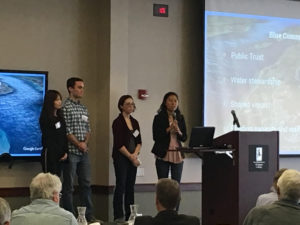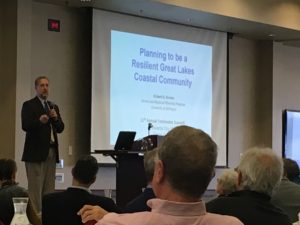
From left to right: Lingzi Liu, Adam Arend, Kaitlin Vapenik, Nancy Ye
The University of Michigan was well represented at the Freshwater Summit held in Traverse City on October 26th. The Freshwater Summit is an annual conference of environmental professionals and engaged citizens focusing on current issues facing the Great Lakes region. The event is the product of the Freshwater Roundtable organized by The Watershed Center, Great Lakes Water Studies Institute, Michigan Sea Grant Extension, Great Lakes Environmental Center, Inland Seas Education Association, NOAA’s Office for Coastal Management and Grand Traverse Conservation District.
Richard Norton, Professor of Urban & Regional Planning and the Program in the Environment, gave a presentation entitled, “Planning to be a Resilient Great Lakes Community”. He focused not only on factors like climate change and economic sustainability but also on the legal framework that governs coastal communities giving the audience an overview of the dynamics that come into play when thinking about and planning for resiliency.

Dick Norton, Professor of Urban & Regional Planning and the Program in the Environment
The program also included a presentation by UM students Adam Arend, Environmental Policy graduate student; Kangyu Yu, Landscape Architecture graduate student; Nancy Ye, School for Environment and Sustainability graduate student; Kaitlin Vapenik, Environmental Informatics graduate student; and Lingzi Liu, Landscape Architecture graduate student. Their presentation titled, “Blue Communities Vison for Grand Traverse Bay” reported on their investigations focused on public trust, water stewardship, shared visioning and how to build capacity in the region.
U.S. Senator Gary Peters provided an overview and update on federal initiatives relevant to the Great Lakes and took questions from the audience related to the local impact of these programs. Other speakers focused on understanding the factors impacting historical and future changes in great lakes water levels and documenting the economic impacts of the Great Lakes Restoration Initiative led by the Great Lakes Commission. The day also included updates on various local initiatives such as the Boardman River dam removal and the research work in progress to support the implementation of the proposed FishPass, as well as an opportunity for Northwestern Michigan college students to share their internship experiences with community engagement in water management. Overall the day provided the ‘big picture’ view of the great lakes system but also highlighted local Grand Traverse Bay projects that in their own way impact the whole in terms of data collection, restoration or important collaborative efforts.

